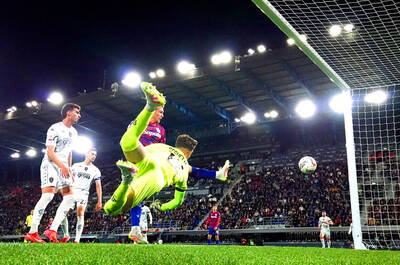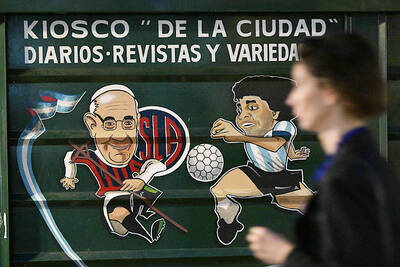The sidewalks and parks in Doha are empty in June, as residents head to the air-conditioned malls for relief from temperatures that soar to 48ºC. Professional soccer players from the region flee to the cooler climes of Europe to train and anyone looking to cool off with a cold beer in Qatar’s capital has to make do with a handful of pubs hidden in five-star hotels, since drinking alcohol anywhere else is prohibited in the conservative Muslim country.
Still, Qatar has brushed aside questions about its climate and social constraints to launch an ambitious campaign to host the 2022 World Cup that is also being sought by the US, Australia, South Korea and Japan.
In some ways, Qatar is the wild card in the competition to win over FIFA’s 24-man executive committee. It’s the smallest nation bidding and the only one that has not hosted either an Olympics or World Cup. At the same time, the Persian Gulf nation of just 1.3 million has the financial muscle to guarantee a successful tournament — it has the world’s second-highest per capita income thanks to its vast oil and gas reserves.
“I believe we have a very strong bid and a very unique bid,” said Hassan al-Thawadi, the chief executive of the Qatar bid committee. “It’s a historic bid in terms of coming for the first time to the Middle East, a region that is very hospitable, rich and diverse in terms of its culture and has an unprecedented passion for the game. Bringing it to the Middle East will truly allow football and FIFA to reach its true potential as a culture event.”
Qatar has taken an aggressive approach to promoting the bid. It struck a deal to sponsor the Confederation of African Football Congress in January, negotiating an agreement that gave it exclusive access to the top officials in African soccer. It also plans to fly Brazil and Argentina into Doha for an exhibition match just two weeks before the winning bids for the 2018 and 2022 World Cups are announced in December.
It also hired the likes of Dutch great Ronald de Boer and Barcelona coach Pep Guardiola to promote the bid, as well as consultant Mike Lee, who was instrumental in helping London secure the 2012 Olympics and Rio de Janeiro the rights for the 2016 Olympics.
“They have the money and they will spend generously on this,” said Abdul-Khaleq Abdulla, a political science professor at Emirates University in Abu Dhabi. “There is no limit to how much they could pay. Money talks in these events. It has been proven time and again. If you are serious, you have to raise your investment profile.”
Al-Thawadi said Qatar is developing “second-generation cooling technology” that will keep the stadiums, training facilities and fan areas at about 27ºC, far cooler than the 41ºC that Qatar averages in June, July and August. Qatar also plans to allow alcohol consumption in fan zones and bathing suits to be worn at hotel pools.
Al-Thawadi, a soccer fan educated in England, acknowledged that he was inundated with questions concerning Qatar’s weather when he visited South Africa for the recent World Cup, but he says once he explains the proposed system that continuously pumps cool air into the venues, most people come away convinced Qatar can keep the heat at bay during matches.
“I will tell people who have heat concerns: ‘Come to the Qatar, visit the country and see what it has to offer,’” al-Thawadi said. “Meet the people and meet expats who come from cold countries and make Qatar their home, and are here over the summer and haven’t left. The concerns shouldn’t be much of a concern at all.”
To bolster its case, Qatar has unveiled a US$4 billion plan to build nine stadiums and renovate three others — all with the new cooling system. A prototype stadium for five-a-side soccer is scheduled to be on display when FIFA’s inspection team visits next Monday and the technology “will be tweaked” over time to ensure it can also be used at training sites for the 32 competing teams and at fan zones, al-Thawadi said.
FIFA president Sepp Blatter also gave Qatar’s bid a boost earlier this year when he said the Arab world deserves to stage a World Cup, but critics question whether Qatar’s largely untested cooling system will work and many remain unconvinced that Qatar will relax its conservative ways.
“It would not be in the best interest of FIFA to allow Qatar to host the World Cup in 2022,” said Austrian strategist Erwin Roth, who has spent almost three decades promoting international sporting events. “A lot of problems would arise. What do you do with the fans when the games are over? You will have all fans in this tiny, little city in 40-plus centigrade temperatures. Where do you put them? You would have to build zones where they party and women would be allowed.”
Simon Chadwick, a sports marketing expert at Coventry University in England, said Qatar’s bid has been helped by the success of South Africa, which showed that a developing country with a history of problems could host a successful World Cup.
“There are concerns about the culture of Qatar,” Chadwick said. “You are going to watch football. Are you going to be able to drink heavily, eat pizza and hang around in the streets singing songs? People perceive that because Qatar is a Muslim country that they won’t be able to do that.”

Bologna on Thursday advanced past Empoli to reach their first Coppa Italia final in more than half a century. Thijs Dallinga’s 87th-minute header earned Bologna a 2-1 win and his side advanced 5-1 on aggregate. Giovanni Fabbian opened the scoring for Bologna with a header seven minutes in. Then Viktor Kovalenko equalized for Empoli in the 30th minute by turning in a rebound to finish off a counterattack. Bologna won the first leg 3-0. In the May 14 final in Rome, Bologna are to face AC Milan, who eliminated city rivals Inter 4-1 on aggregate following a 3-0 win on Wednesday. Bologna last reached the

If the Wild finally break through and win their first playoff series in a decade, Minnesota’s top line likely will be the reason. They were all over the Golden Knights through the first two games of their NHL Western Conference quarter-finals series, which was 1-1 going back to Minnesota for Game 3 today. The Wild tied the series with a 5-2 win on Tuesday. Matt Boldy had three goals and an assist in the first two games, while Kirill Kaprizov produced two goals and three assists. Joel Eriksson Ek, who centers the line, has yet to get on the scoresheet. “I think the biggest

From a commemorative jersey to a stadium in his name, Argentine soccer organizers are planning a slew of tributes to their late “Captain” Pope Francis, eulogized as the ultimate team player. Tributes to the Argentine pontiff, a lifelong lover of the game, who died on Monday at the age of 88, have been peppered with soccer metaphors in his homeland. “Francisco. What a player,” the Argentine Football Federation (AFA) said, describing the first pope from Latin America and the southern hemisphere as a generational talent who “never hogged the ball” and who showed the world “the importance of having an Argentine captain,

Noelvi Marte on Sunday had seven RBIs and hit his first career grand slam with a drive off infielder Jorge Mateo, while Austin Wynn had a career-high six RBIs as the Cincinnati Reds scored their most runs in 26 years in a 24-2 rout of the Baltimore Orioles. Marte finished with five hits, including his eighth-inning homer off Mateo. Wynn hit a three-run homer in the ninth off catcher Gary Sanchez. Cincinnati scored its most runs since a 24-12 win against the Colorado Rockies on May 19, 1999, and finished with 25 hits. Baltimore allowed its most runs since a 30-3 loss to